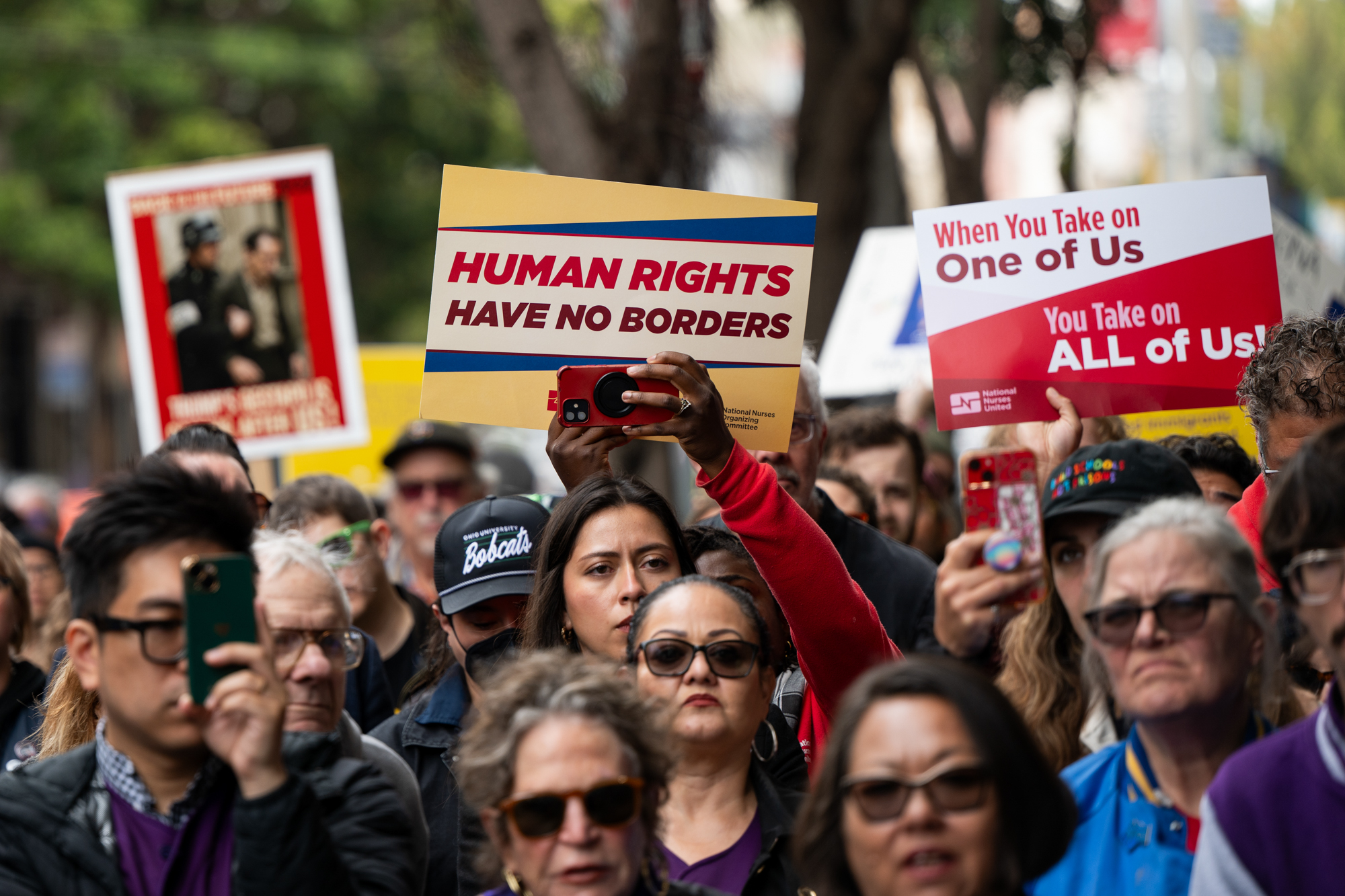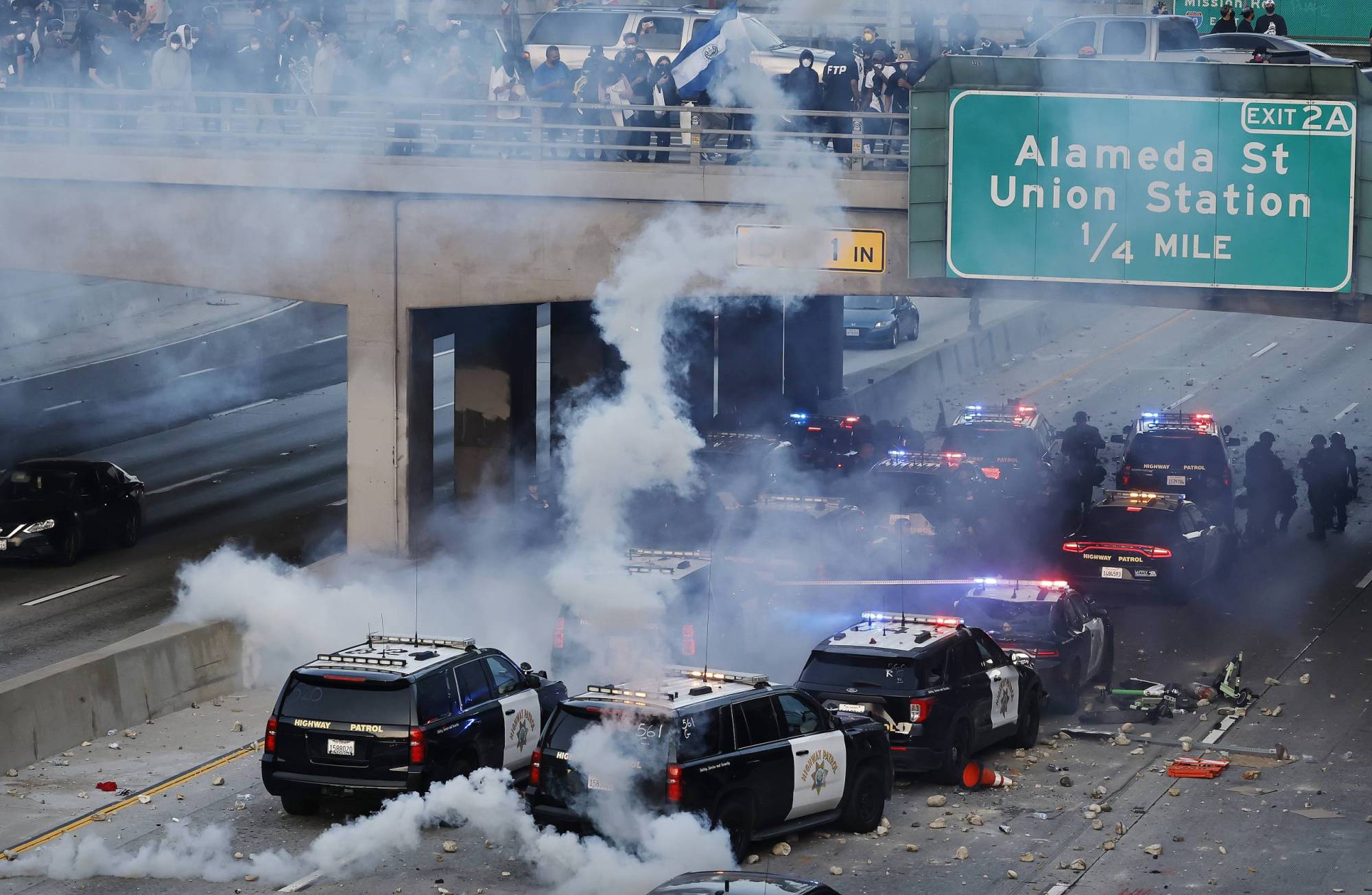California also has its own expansive free speech provisions under Article 1, Section 2 of the state’s constitution that protect and reaffirm many of these rights.
The First Amendment also gives you the right to film police who are actively performing their duties, and bystander videos can provide important counternarratives to official accounts. Read our guide to filming encounters with the police safely and ethically and where to share your footage.
“These rights are all really powerful, and they protect our democracy,” said Chessie Thacher, senior attorney with ACLU NorCal’s Democracy and Civic Engagement Program.
What doesn’t the First Amendment cover during a protest?
First Amendment rights are “not unlimited, and they depend on various factors,” stressed Thacher, including:
When you’re speaking
Even in public spaces, the government can impose what is known as “time, place and manner restrictions” that dictate certain parameters to try to ensure safety.
An example, Thacher said, is that the city can prevent people from using a loud bullhorn at 2 a.m. in a city square because people may be sleeping. But they can’t stop a person from using the same bullhorn at lunch hour the next day.
Where you’re speaking
You have a lot of protections in public spaces, like a park or a sidewalk. But if you are speaking at a private location — like someone’s backyard — “you don’t have many speech protections,” Thacher said.
The gray area: If you are speaking in a place that is “sort of public, like a school campus or a library,” then your rights to free speech “are somewhere in the middle,” she cautioned. “But even then, the government can’t punish you because they don’t like you.”
Who is speaking
If you are speaking as a private citizen on your personal time about something of public concern, your speech is protected.
However, Thacher noted, that speech is “a lot less protected” if, for example, you work for the government — since someone may think you are speaking for the government, and “the government has the right to decide its speech for itself,” she said. This can also happen when a teacher or a police officer is a speaker, and people may assume they are speaking on behalf of their workplace.
What are some things people misunderstand about the First Amendment and protesting?
Some misconceptions about the First Amendment, said Thacher, include:
It does not mean freedom from consequences
While the First Amendment prohibits the government from punishing you for your speech, “it doesn’t protect you from actions that a private employer might take because of your speech,” Thacher said. “It doesn’t protect you from receiving feedback from people about what you’re saying.”
It does not protect the “heckler’s veto”
Under the First Amendment, within some boundaries, you don’t have the right to shut down another person’s right to speak. For example, this could include yelling louder than another speaker so that other people cannot hear them.
It does not protect against true threats, incitement, fighting words or harassment.
The First Amendment also does not protect against “violent or unlawful conduct, even if the person engaging in it intends to express an idea.”

When you’re protesting, where are your rights strongest?
The First Amendment, Thacher said, dates back to a time when locations like marketplaces were considered to be “the centerpiece of a community” — “so public spaces like town squares, sidewalks and other highly visible, publicly-owned property that are open to the public are where you have the most rights to free speech.”
The only thing people’s rights can be subjected to in public spaces is the reasonable “time, place and manner restrictions” mentioned above. Those restrictions also must be “content-neutral,” meaning it cannot be specific to your speech, Thacher said.
However, she added that it is a “totally different equation” if you are at someone’s house — since you are there at the invitation of the property owner, not the government.
Places where the public is invited at certain times, such as a public library or a public school cafeteria, are in-between spaces sometimes called a “limited public forum,” and “any restrictions of speech there must be viewpoint-neutral and reasonable in light of the forum’s purpose,” Thacher said.
Can I legally attend a protest if I’m not a U.S. citizen?
This is a question that’s only become more pressing against the backdrop of high profile activity by U.S. Immigration and Customs Enforcement (ICE) agents in recent months, spurred by President Trump’s promises to conduct mass deportations in his second term. June’s protests in Los Angeles came as ICE announced the arrest of over 100 immigrants in the city over the previous week. In the same period in San Francisco, at least 15 people were arrested following appearances at ICE check-ins, including a 3-year-old.
The technical answer is: yes, you can attend a protest as a non-citizen. “As a general rule, people who are not citizens have the same First Amendment rights as citizens,” said attorney Carl Takei, the community safety program director at the Asian Law Caucus: a civil rights organization based in San Francisco that offers services to low-income, immigrant, and underserved Asian Americans and Pacific Islander communities.
The First Amendment of the United States Constitution is meant to protect your five basic rights, and whether you have a green card or no permanent legal status you are still protected by the Constitution. This includes your right to be part of a peaceful assembly, like a march or rally.
However, judges have argued that many of the Trump administration’s plans and actions right now flatly go against the Constitution. And legal scholars and immigration advocates have warned that the president is testing his ability to challenge due process in the area of immigration particularly.

But what if you’re a non-citizen who’s determined to attend a protest right now? Undocumented people and green card holders have always faced additional risks at a protest that citizens don’t, warned Takei — especially when law enforcement gets involved.
“A green card holder is required under federal law to carry evidence of their permanent resident status,” he explained. He adds that carrying a fake green card or identification and presenting that to law enforcement could make the situation a lot more difficult.
“If you’re stopped by the police, you have the same rights as anyone else,” Takei said. “You don’t need to consent to a search, answer questions or sign anything.” Even if the situation seems intimidating, Takei explains, you have the right to remain silent and not share personal information with law enforcement.
And if you’re asked a question about your immigration status and debating whether to share false information or remain silent, “it’s better to remain silent,” said Takei.
But ultimately, if you’re set on protesting as a non-citizen, the most important thing you can do to protect yourself is to make a safety plan for yourself before going to a protest, he recommended. “Write out the contact information for resources, including an attorney or legal organization, and make sure that you’ve talked with friends or family about what to do if you are arrested or if anything goes wrong,” he explained.
What does the law say about free speech on campuses?
Legal experts have interpreted the First Amendment to mean that public institutions are restricted from punishing speech. However, California also has Leonard’s Law that “prohibits private universities from making or enforcing a rule that subjects an enrolled student to disciplinary sanctions solely on the basis of speech protected by the First Amendment,” according to the University of Southern California’s website.
Dan Mogulof, assistant vice chancellor of public affairs at UC Berkeley told KQED Forum in 2024 that the University of California had changed its policy on responding to “non-violent political protests” after the 2012 Occupy Wall Street movement in which an officer pepper-sprayed a group of UC Davis protesters. (UC Davis settled a federal lawsuit with the students, paying around $1 million to the affected protesters.)
“That policy requires us not to call in law enforcement preemptively, and only when there’s a clear, imminent threat to the campus, to life, safety and to the safety of the campus community,” Mogulof said.
Is it legal to protest on the roads?
Bridges and highways are considered open public spaces — and public forums — but they are subject to safety and traffic issues.
“There can be civil disobedience. That could be a way of advocating for a cause, but it’s not protected First Amendment right to do that because the public and the government can have a compelling interest in making sure that those roadways and spaces are open and safe,” Thacher said.
However, she noted that in her opinion, “a lot of the times, the justification of public safety gets overused to punish protesters and speakers.”
What can I actually be arrested for at a protest?
“If you are looking to exercise your right to free speech lawfully and peacefully, you should not be arrested,” Thacher said. “But sometimes things happen.”


